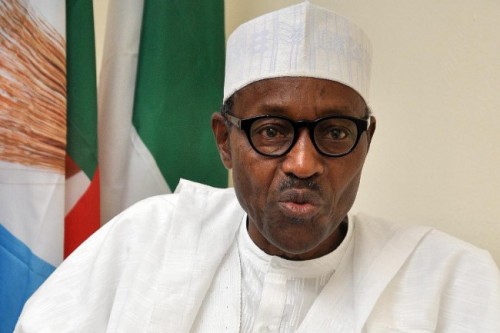
Speaking extempore, because according to him, he wanted to “speak from the heart,” the President urged them to be good ambassadors of Nigeria, a country he went to the warfront to keep together.

Speaking extempore, because according to him, he wanted to “speak from the heart,” the President urged them to be good ambassadors of Nigeria, a country he went to the warfront to keep together.
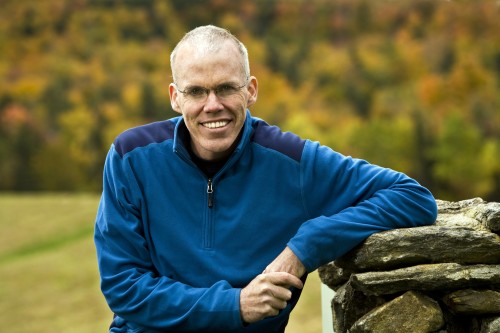
The call comes as record droughts and rainfall as well as relentless heatwaves claim lives around the globe and some of the world’s biggest polluters attempt to co-opt the treaty process and influence negotiating outcomes. The meeting in Bonn, concluding June 11, is one of the last formal meetings of the Parties before the next full Conference of the Parties to the treaty in Paris – largely regarded as a make-or-break moment for the agreement.
Ecosur Afrique, the leading carbon finance group in Africa; Investisseurs & Partenaires (I&P), an impact investment fund dedicated to small and medium size enterprises in Sub-Saharan Africa and Volta cars Rental Services (VRS), a car leasing company operating in West Africa, have announced the first ever carbon credits transaction involving a seller and a buyer from West Africa.
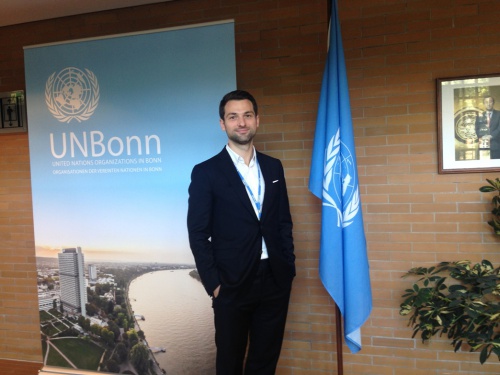
The transaction, which has been structured by ecosur afrique, allows VRS customers to offset the CO2 emissions of vehicles leased in Ghana, Côte d’Ivoire and Senegal. Thomas Crand, the co-founder of VRS, states: “We develop a strong environmental strategy; CO2 emissions are at the heart of our concerns and we are pleased to offer our customers the option to offset their carbon footprint. The transaction, that took place on Monday, June 15, 2015, is pioneering and a unique choice, which distinguishes us on the West African market. We hope it will become standard in our sector.” VRS will aggregate the offset demand of customers taking part in the “carbon neutral” programme each quarter and for the whole fleet concerned. The carbon credit purchases will be made with same periodicity.
The carbon credits, or emission reductions, which are at base of the offset transaction, are generated from the dissemination of energy efficient cooks toves in Côte d’Ivoire. The cook stoves are distributed as part of the “Soutra Fourneau” programme financed and operated by ecosur afrique. They allow to reduce charcoal consumption of small entrepreneurial users such as restaurants or canteens. The use of charcoal and firewood for cooking purposes remains a major source of CO2 emissions and deforestation in West Africa. Beyond the environmental aspect, the benefits are numerous: redistribution of purchasing power to consumers, decrease of noxious fumes, reduction of meal preparation time by half.
Fabrice Le Sache, CEO of ecosur afrique, explains the background of this pioneering transaction: “The exchange of carbon credits involves traditionally their transfer from developing countries to industrialized countries. We are convinced that the future of the market lies in part in the development of the South / South transactions, particularly within Africa. We have been working for several years on our carbon credit offer in order to create sufficient liquidity allowing the emergence of such a market. With over 40 projects in 17 countries, we now have the largest portfolio of African carbon credits in terms of volume and diversity. We must now increase and expand the demand; Similar CO2 offset transactions are under negotiation with African hotel chains, carriers and agribusinesses.”
As a private investor of VRS, I&P played a major role in the operation. The fund began by offseting its own CO2 emissions in an exemplary manner and proposed this solution to some companies in its portfolio in the following, particularly to those, which are concerned by this topic (logistics, transport, distribution of fresh products). Jean-Michel Severino, CEO of Investisseurs & Partenaires, said: “I&P shows, once again, its commitment to pioneering entrepreneurial ideas, both to strengthen the business model of its holdings, to offer them distinctive solutions in their market and to assist them in environmental and social performance, a pre-condition of economic sustainability.”
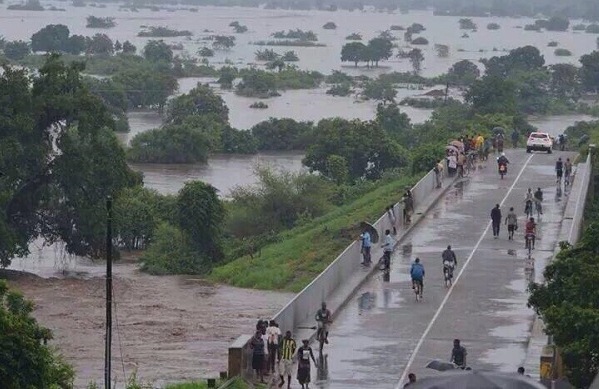
Natural disasters have just been some technical explanation by officials at the Department of Disaster, an arm of the government dealing with all that man-kind has inflicted upon the self through careless care of God’s creation.
Due to ‘disappointing yields and poor quality cotton fiber,” the country of Burkina Faso in West Africa is ditching Monsanto’s genetically modified cotton

Jeune Afrique reports that Interprofessional Cotton in Burkina Faso has decided to phase out the use of Monsanto’s GMO cotton seeds over the next three years. This is a group of cotton farmers, banks, research institutions, private stakeholders and the government. It isn’t just cotton farmers that are complaining about Monsanto’s GM cotton, though.
Interprofessional Cotton members include the Société burkinabè des fibres textiles (Sofitex), Faso Coton, and the Société cotonnière du Gourma (Socoma, subsidiary of the French group Geocoton).
All of these groups have complained that Monsanto’s GM cotton did not produce quality cotton fiber, and farmers have experienced lower yields than with non-GM cotton. The group will also seek compensation from Monsanto for lower yields they experienced since the 2008 growing season.
The group is denouncing its contract with Monsanto due to the lower quality performance of the GM cotton, and also lower yields.
Advocates of GM cotton state that they have increased agricultural production by more than US$98 billion and saved an estimated 473 million kilograms of pesticides from being sprayed in the US, but critics question their environmental, social, and economic impacts – with good reason. Among the complaints are that GM cotton has caused superweeds, and driven Indian farmers to suicide.
Genetically modified organisms and crops are so controversial that communities, states, and even entire nations are at the very least attempting to ban or suspend these creations – with some areas having notable success. A small example within the U.S. can be seen when a federal judge in southern Oregon recently decided to uphold Jackson County’s ban on genetically engineered crops after two alfalfa farms requested that the ban be blocked.
Another example can be seen with the nation Hungary, which could be the first to introduce the new European Union regulations allowing countries to ban the cultivation of GMO crops.
An observer remarked: “As time goes on, you can expect to see more suspensions and even bans on Monsanto’s GMOs as well as the company’s herbicidal chemical creations meant to be sprayed on GMO crops.”
Twenty-three members of the U.S. Congressional Black Caucus (CBC) have expressed solidarity with people in the global community standing in support of the human right to water, with particular mention of the dangers of privatisation of water in Lagos, Nigeria.
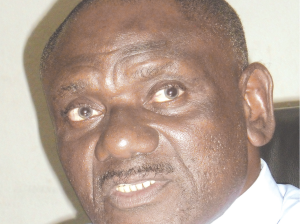
The solidarity was expressed in a letter signed by about half of the CBC, expressing sentiments which the Environmental Rights Action/Friends of the Environment (ERA/FoEN) believes underscores “the disproportionately harmful effect water privatisation schemes, including public-private partnerships, have on people of colour around the world, with signatories pointing specifically to efforts to privatise water in Lagos, where the World Bank has pushed privatisation as a solution despite its abysmal track record.”
The letter draws from two US examples – Detroit and Baltimore. By prioritising revenue over access, much as a private utility would, the cities have raised rates and forced the shut-off of water access for tens of thousands, drawing the concern of the United Nations Special Rapporteur on the Human Right to Water.
As part of a global movement to oppose corporate control of water, spanning from Jakarta to St. Louis, Baltimore recently avoided potentially perilous contract with global private water corporation Veolia. Detroit Representative John Conyers, Jr. led the signatories with Rep. Karen Bass, ranking member of the Africa subcommittee. Rep. Sheila Jackson Lee, the Democratic co-chair of the Nigeria Caucus, and Reps. Maxine Waters and Emanuel Cleaver, two former CBC chairs, are also among the influential signatories.
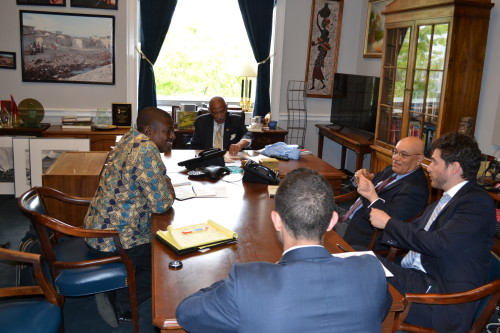
In the US, from Detroit to Baltimore, aggressive collections policies are curtailing people’s access to water, disproportionately affecting communities of colour as the letter’s signers note. In Lagos the World Bank has lobbied for decades to privatise water systems.
In 2012, the International Finance Corporation (IFC) – the private investment arm of the World Bank – held a conference in Senegal to persuade African leaders to privatise their water systems. The conference featured Manila, Philippines as a model for replication, despite that project’s record of massive rate hikes, quality concerns, and communities with severely limited access. International arbitration recently found that major pieces of the Manila deal violate Philippines law.
The letter read in part: “We wish to express our solidarity with the people of Lagos, of Detroit, and of cities around the world as they raise their voices in support of public water, participatory governance, and universal access. Water is a fundamental building block upon which individual and collective economic prosperity relies. When people cannot access or afford clean water, the impact on their health and livelihoods is devastating” … “and these circumstances force families to make painful economic choices.”
Consequently, ERA/FoEN has commended the CBC for its solidarity, describing the action as “timely” in halting the planned privatisation of water in Lagos.
ERA/FoEN Director, Corporate Accountability & Administration, Akinbode Oluwafem,i said: “The solidarity letter from the CBC is an encouragement for anti-privatisation groups to scale up our campaign against policies that prioritise profits over rights. We expect the Lagos State government to halt the privatisation plans and instead defend the rights of the vast majority of Lagos residents that water privatisation will disenfranchise.”
Oluwafemi, who recently visited CBC offices to seek support for the campaign against water privatisation in Lagos promoted by the Lagos State Water Corporation (LSWC), thanked members of the caucus for supporting the campaign by Lagosians to defend their right to a free gift of nature. But Shayo Holloway, managing director of the Lagos State Water Corporation, denied the allegation, insisting that government is partnering with the private sector and not privatising water.
Nonetheless, ERA/FoEN and a coalition of labour, human rights and environmental groups had severally taken to the streets to pressurise the authorities that water privatisation was a central issue in the recent elections.
Supporting the move, Shayda Naficy, Challenge Corporate Control of Water campaign director at Corporate Accountability International, said: “Around the globe, the human right to water is under threat and people of colour are disproportionately affected. Whether it’s the World Bank or Detroit City hall, this fundamental right must be upheld. The best way to do that is to keep water systems democratically accountable and in public hands.”
The CBC members learned recently that the coalition of Lagosians, in the face of this relentless lobbying from the World Bank, have raised the visibility of the plans and organised to stop it in its tracks. The campaign has engaged directly with candidates and elected officials on the issue, and marched through the streets of Lagos, but privatisation remains a risk. The group’s most recent visit to Washington, DC made clear to members of Congress that what threatens water in Lagos threatens the water of people across the U.S. as well.
Congressional co-signatories of the letter include: Alma Adams (D-NC), Karen Bass (D-CA), Corrine Brown (D-FL), Wm. Lacy Clay (D-MO), Emanuel Cleaver (D-MO), John Conyers, Jr. (D-MI), Elijah Cummings (D-MD), Donna Edwards(D-MD), Keith Ellison (D-MN), Chaka Fattah (D-PA), Sheila Jackson Lee (D-TX),Hakeem Jeffries (D-NY), Brenda Lawrence (D-MI), Gwen Moore (D-WI), Eleanor Holmes Norton (D-DC), Donald Payne (D-NJ), Stacey Plaskett (D-VI), Charles Rangel (D-NY), Cedric Richmond (D-LA), Robert Rush (D-IL), Marc Veasey (D-TX), Maxine Waters (D-CA) and Frederica Wilson (D-FL).
Polar bears are now eating dolphins lured north by warming water.
Scientists for the first time observed the bears feasting on white-beaked dolphins in Svalbard in the Norwegian Arctic. They theorise the dolphins, coaxed northward by warmer waters, were trapped under the ice and killed by the bears when coming up for air through a small hole, they wrote in a new study.

“This is the first record of this species as polar bear prey,” the authors led by the Norwegian Polar Institute’s Jon Aars said in the paper published this month in the Polar Research journal. “The warming of the Arctic is significantly changing the ecosystem and relations between species.”
Climate change is rendering increasing areas of the Arctic ice-free during summer months. While the dolphins often visit Svalbard in warmer months, they haven’t been reported that far north in early spring. The researchers observed seven more dolphin carcasses near the area in the following months.
One of the bears was so skinny his ribs were visible through the fur, they said. After the bear had eaten one dolphin, it covered up another with snow to save for later.
As the Arctic warms amid changing climate and ice sheets thin, dolphins could become a more regular meal. For the bears, that’s good news as access to their more usual food supply, seals, may further decline because of the milder weather.
By Stefan Nicola (Bloomberg Business)
The Environmental Rights Action/Friends of the Earth Nigeria (ERA/FoEN) presents this Memorandum to President Muhammadu Buhari as well as policy makers and law makers at the National Assembly for a sustainable Nigeria. The document identifies several priority areas as cardinal to meeting citizens welfare, while presenting some indicators in which the present government’s success will equally be measured.
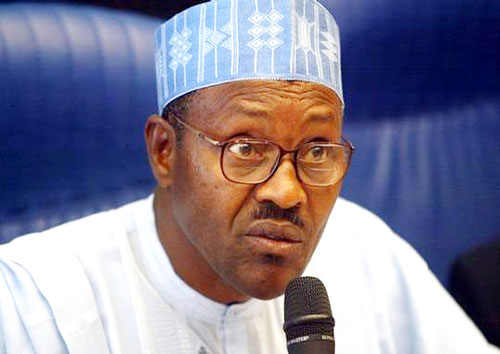
Energy Access and Off-Grid Options
Energy, in particular, oil and gas, has continued to contribute over 70% of Nigeria’s federal revenue. Regrettably, Nigeria has relied too heavily on its oil and gas resources to the detriment of other renewable sources of energy as its main source of energy. Available statistics show that only about 40% of the nation’s population has access to electricity from the national grid, leaving close to 95 million people relying on the traditional use of wood and kerosene for cooking with its attendant health implications.
Oil exploration in Nigeria has led to monumental environmental damage to communities in the Niger Delta, while energy poverty has increased the rate of deforestation and loss of forest cover with about 72% of the population depending on biomass as source of cooking energy (GCN, 2010).
The unfolding effects of climate change, the production and use of energy remains the twin problem of induced climate change and global energy poverty. Therefore, the deployment of cleaner energy solutions, particularly renewable, is paramount to reduce emission of greenhouse gases, protect the environment and enhance sustainable development.
On a long term basis, rather than focus attention on oil discovery in the Chad Basin, a post petroleum economy for Nigeria should be the focus drawing lessons from the Delta Beyond Oil Masterplan that seeks to deliver on sustainable development through renewable energy sources. There is a need of shift from fossil fuel based energy sources to cleaner energy such as solar and mini-dams as alternatives to drive future development within planetary boundaries. Renewable energy has emerged as the most favoured alternative to fossil fuels because of its low carbon nature, low rate of depletion, high rate of regeneration and inherently sustainable component. The provision of reliable, clean, and affordable energy access is required to create economic opportunities, harness the economic potentials of the rural areas to reduce poverty, stall rural-urban drift, enhance educational potentials for rural school children and encourage the growth of Small and Medium Enterprises (SMEs) in the rural areas and attain the MDGs.
The National Energy Policy (2005) emphasised the importance of renewable energy to achieving sustainable development through the expansion of overall access, targeting access rate of at least 75% by 2020. The National Policy and Guidelines on Renewable Electricity, and the on-going Petroleum Industry Bill (PIB) also emphasised the importance of renewable energy.
However, renewable energy options are suitable off-grid and stand-alone systems. Based on a 10% economic growth rate and the corresponding ECN’s projected electricity demand profiles of about 16,000MW, 30,000MW and 192,000MW in the short, medium and long terms in the country, the document envisaged, that renewable energy (RE) would contribute about 13%, 23% and 36% of the total electricity demand of the nation in the short, medium and long terms, respectively (ECN, 2007). Nigeria needs to be in the forefront of the renewable energy revolution by dedicating adequate resources for research and development that will drive this process.
The UNEP Assessment Report Recommendations on Ogoni
It will be recalled that the FGN commissioned the United Nations Environment Programme (UNEP) to assess the level of environmental pollution in the Ogoniland occasioned by years of spillage from oil operations in that area. The UNEP Environmental Assessment of Ogoniland Report released on August 4, 2011 made far-reaching recommendations for the cleanup, which it envisaged will take up to 30 years and cost an estimated $1billion. While government accepts the report, it has however not demonstrated sufficient commitment to implement the recommendation. It is therefore ironic, that despite several millions of Naira invested in the report and countless agitations by interested stakeholders, the Report has been subjected to political machinations and intrigues, while the environmental degradation continues almost unabated.
Your administration will do well to study the report with a view to fully implement its recommendations, which will certainly reduce environmental hazards and improve livelihoods of the affected communities.
Environmental Sustainability of the Niger Delta: Overhauling the JIV process
Closely linked to the UNEP Report is the general environmental concerns in the Niger Delta region which are well documented and further exacerbated by continued poor environmental enforcement, low level of commitment by operating companies and unbridled frustration by affected communities due to perceived neglect of government. ERA/FoEN-led coalition of CSOs and Host Communities Network urges the government to compel the transnational oil companies to halt gas flaring and commence the clean up of the over 10,000 oil spill sites by the establishment of US$100 million clean up and remediation fund for the entire Niger Delta. The socio-economic costs of inaction, economic and health losses and fast depleting biodiversity in the region have not been properly quantified neither is any one held accountable for such losses. The inability of government to hold culprits to account and non-enforcement of the Polluter-Pays Principle has encouraged the culture of impunity with grave consequences to the environment, rural livelihood sources and serious environmental degradation.
Environmental risks and ecological scarcity are being heightened. Rather than selective settlement, the root cause of grievance and environmental pollution should be dealt with decisively.
In particular, the mandatory Joint Investigation Visit to oil spill sites is currently led by the oil companies who are also responsible for the spill. It is the oil companies who put the logistics together and eventually decide the cause of spill, level of impact and extent of remediation rather than the NOSDRA with the statutory functions. The resulting Joint Investigation Report has been noted to criminalise communities, even falsified date and extent of impact in order to reduce damages and liability as the Bodo and Shell case show. Even though the issue is being settled out of court with US$83 million being paid to victims, it ought to be the concern of this government about how a company Shell has treated citizens of Nigeria with falsification of documents and manipulations of the JIV process.
ERA/FoEN advocates for stronger commitment from the government to hold every polluter accountable for both clean up and remediation of any affected area and strengthen institutions to avoid “regulator capture” which has often rendered government’s efforts useless. Attention should be paid to the Ministry of Environment, NESREA and NOSDRA so that they can properly be equipped to conduct their statutory regulatory and enforcement duties.
Climate Change and National Economic Development: The Climate Change Commission Bill
That this present government has pledged to focus attention on climate change is significant. But it can hardly do this without a strong institutional base to drive the process. There is a global consensus that climate change will stunt economic development if no urgent actions are taken. Nigeria has committed to the global effort to reduce the impact of climate change by signing both the UNFCCC and ratifying the Kyoto Protocol. Appropriate policies like the National Climate Change Policy and the National Adaptation Strategic Action Plan (NASPA) have been adopted. However, because climate change is crosscutting and directly affects economies of nations, a strong national institution that will provide appropriate climate governance is being advocated. Such national institution will provide leadership, coordination, create access to resources and information to fully respond to the present and future dangers of climate change.
Nigeria has pioneered the legislation for the establishment of a specialised National Climate Change Commission/Agency through the Bill for the establishment of a Commission since 2009. However the Bill has not been assented by former President Jonathan. It is instructive to note, that countries like Philippine, Mexico, Columbia and Kenya who have adopted the Nigeria’s proposed model have since established statutory Commissions to provide climate governance and resilience in their respective countries.
ERA/FoEN recalls then the President-elect’s acceptance speech where he commits to addressing the climate challenge that presently incapacitates livelihoods. ERA/FoEN urges the president to champion the fight against climate change by the establishment of a dedicated commission directly under the presidency in line with current global practices.
The Petroleum Industry Bill (PIB)
The PIB was introduced to restructure the oil and gas sector through unbundling the existing NNPC with specialized agencies and bodies. Amongst other things the Bill seeks to ensure that the management and allocation of petroleum resources and their derivatives shall be conducted strictly in accordance with the principles of good governance, transparency and sustainable economic development; enshrines the principles of transparency and good governance by stating that institutions of the industry shall be guided by the principles of the Nigerian Extractive Industry Transparency Initiative (NEITI) and the provision for participation of the people in the decision making process and fully provides for the right of citizens to know about processes of the industry.
The Bill has been subject to intense debate and political intrigues despite that the philosophy and principles of the Bill have been generally accepted. While the present legislature has promised to pass the Bill before the expiration of the current legislature year, it behooves on the new administration to ensure the full implementation if passed that so that local participation in community development process is enhanced.
In the event of non-passage of the Bill, the President is called upon to accelerate the passage of the Bill by working with the National Assembly to ensure probity and accountability for the general good of the economy and the people. The Bill if passed will increase revenue for Nigeria, account for frequent oil spills and cleanup process and arrest the spate of oil theft.
Who is Afraid of Oil Pipelines Metering?: Publish What You Pump
Surprisingly, the amount of oil extracted in Nigeria on a daily basis is unknown. What is known is the amount offered for sale at the export terminals. ERA/FoEN suggested to the past administration the need for metering of the oil pipelines, oil wellheads, and flow stations down to the export terminals but the oil companies by consensus were opposed to this. It will surprise Mr President that the amount of oil extracted from Nigeria is basically unknown. What is known is the volume offered for sale. In this way, the massive oil theft currently on-going is unaccounted for. The question this government should ask and deal with is: “who is afraid of oil pipeline metering?” so that Nigeria can ascertain the actual volume of oil extracted from Nigeria which far exceeds the records of about 2.4 mbpd.
Social Justice and Equity: National Basic Income Scheme for the Unemployed
Years of failed promises, dashed expectations and limited opportunities for selfactualisation have been perceived by a large portion of the population as injustice. This has elucidated protests and to some extent armed struggle of diverse levels and characteristics across the country. Inequitable distribution of the nation’s endowed natural resources and the widening gap between the rich and the poor has increased a sense of social exclusion and public participation. Despite consistent GDP growth, Nigeria continues to experience “growthless growth” as poverty and joblessness have become pervasive. The absence of necessary social security safety nets like medical insurance, welfare particularly for the poor coupled with lack of access to energy, water and a safe environment have continued to demoralise meaningful contribution from this segment of the population.
As part of the solution, ERA/FoEN has continue to advocate for reforms that will guarantee livelihoods like the right to a clean and safe environment, right to access to water and public participation in environmental issues as a fundamental right under the Nigerian Constitution. A regime that ensures social justice and equity is the first step towards ensuring a sustainable Nigeria.
The Niger Delta is destroyed by oil impact so also is the 11 frontline states of the north by desertification. In particular, the Fulani-Hausa herdsmen-famers conflict over grazing and farmlands for food has spilled to the south. In Eastern Nigeria, gully erosion, and in Western Nigeria, deforestation has impacted rural livelihoods.
Selective payment to a few cannot be the answer to mass unemployment and security. Since rural livelihoods sources have been affected throughout Nigeria, ERA/FoEN further advocates for the adoption of a National Basic Income Scheme (NaBIS) of about N10,000 to be paid to ALL Nigerians who are unemployed to reduce the gad of social disparity and income inequalities to cushion the meagre earnings of the poor and provide some safety valves in desperate times. ERA/FoEN urge Mr. President to adopt NaBIS that has the prospects of unlocking creative potentials, reduce crime rates, and foster national cohesion and to give a sense of belonging to this group of Nigerians desperately in need of succour.
ERA/FoEN believes that Nigeria can only make meaningful progress through efficient use of its natural resources in a sustainable manner. A “Change” agenda that will “result to improved human well-being and social equity while significantly reducing environmental risks and ecological scarcities” (UNEP).
Apart from statutory allocation to this NABIS Fund by deemphasising individual security but the collective, all Nigerians earning N500,000 and above on a monthly basis (or N6 million per annum) will be too willing to contribute 1% of their earnings to this fund. A social Security Fund for the Unemployed is long overdue. In the past, Governors Fayemi (Ekiti), Mimiko (Ondo) Dickson (Bayelsa), and Uduaghan (Delta) were already implementing monthly stipends to alleviate old age poverty. This experience can be built upon successfully by the use of biometrics.
Poverty, Unemployment, Population, Electricity Rates: Current Trend
How will the resent government reverse these damaging statistics and reduce the rate of poverty in Nigeria? The Nigeria economy grew at an average of about 6.2 percent annually between 2002 and 2011, the new poverty estimates in 2010/2011 and 2012/1013 is 35.2% and 33.1% respectively (NBS report 2014). Punch Newspaper of February 14, 2012 reported the NBS statistic as 112.519 million Nigerians live in relative poverty condition, this figure was contained in the 2010 Poverty Profile Report of NBS represented 69% of the country’s total population. There is a general disconnect between Nigeria’s economic growth and human development
Nigeria is ranked 156 out of 187 national economies worldwide (UNDP-HDR 2011). In 2004, out of the estimated population of over 130 million in Nigeria, 54.4% lived below the poverty line. The situation worsened in 2011 when 69.1% of the population or approximately 100 million people lived in abject poverty (NBS Report 2011). As of mid-2010, Nigeria’s population was estimated at about 163.4 million (NBS 2011) and a steady annual population growth rate of 2.5%. Presently the population rose from 40,431,790 five years ago to 167,912,561 as at 2014 (NPC).
This represents an annual growth rate of 3.2% or 5.6 million people per annum. The unemployment rate as at 2011 was 24% compare to 21% in 2010, according to NBS 2013, 54% of Nigerian youth were unemployed in 2012 this has continued to rise by 27% annually in 2014 according to NBS.
Conclusion
It is within this context that submission on the above critical issues stalling the development of Nigeria are raised, with a view to getting government to redouble its effort in seeking alternative and sustainable solutions to the current energy poverty in the country. The brief outline here focuses on some parameters which eventually provides a template for scorecard for this present government.
A huge cloud of uncertainty is hanging over the much-vaunted Nigerian REDD+ (Reducing Emissions from Deforestation and Forest Degradation) Programme following the arrest a couple of days ago in Calabar, Cross River State of long-serving and erstwhile chairman of the Cross River State Forestry Commission (CRSFC), Mr Odigha Odigha. He has since been released on bail.
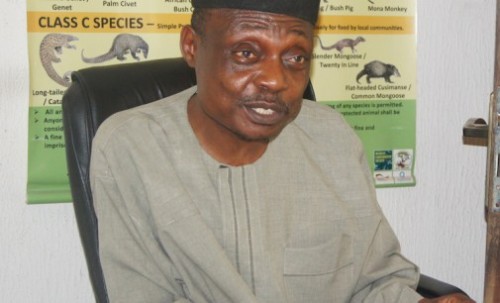
Feelers indicate that new Cross River State governor, Prof Ben Ayade, ordered the arrest of Odigha, along with three directors of the CRSFC in order to pave way for the takeover of the state-owned massive forest reserve – upon which the concept and ideals of the REDD+ Programme is based – by a Chinese firm for exploitation.
Regarded as one of the largest forest blocks remaining in the West African region, the Cross River Forest Reserve covers 312 square kilometres. It lies between the Afi Mountain Wildlife Sanctuary and Mbe Mountains Community Forest, both of which are home to Cross River gorillas, and form a corridor between the two.
An official of the Commission disclosed that the state governor had concessioned the forest to a Chinese paper producing firm and that, going by the terms of agreement, the Cross River forest would be considerably exploited – a policy that Odigha had dedicated is life to over the decades, and prompting the United Nations REDD+ Programme to select the reserve as a pilot site for the programme in the country.
An educator, environmentalist and activist, Odigha was awarded the Goldman Environmental Prize in 2003 for his efforts on protection of the rainforests of Cross River State from industrial logging – an action that did not go down well with some local and international industrialists who see the reserve as a gold mine.
Immediate past governor of the state, Liyel Imoke, was in favour of the conservation and “lock-up” of the forest reserve, and he supported Odigha’s work during his eight-year tenure in power.
But things took a fresh twist immediately after the May 29, 2015 swearing-in of Prof Ayade as governor, who appears not to be an apostle of a complete lock-up of the state forest reserve. According to sources close to him, Ayade believes that the forest should be an avenue to generate revenue that will go a long way in helping it to meet its financial obligations and clear its backlog of debts.
It was also alleged that the governor was furious over the activities of the Forestry Anti-logging Task Force operating within the CRSFC but reporting directly to Imoke.
Speaking with our correspondent on phone, Odigha said he was detained for 24 hours and that the Secretary to the State Government listed as part of the reasons for his arrest was the fact that forests under his care had been depleted. But Odigha denied the allegation, saying that, quite to the contrary, the forest reserve and communities therein prospered when he headed the CRSFC.
“As I speak to you now, the forestry commission has been dissolved and the state anti-deforestation committee has also been dissolved. The secretary to state government alleged that under my leadership the state forests depleted – which is the reason they called for my arrest and dissolved the Board of the Commission,” he said.
Governor Ayade’s aide on media and publicity, Christian Ita, said the governor was not pleased with the United Nations report that the state forests under the watch of Mr Odigha were being stolen by over six per cent annually. He said the arrest of Odigha was to enable proper investigation into the matter to ensure that the state maintained its global leadership in forest matters.
An environmentalist, Dr Okon Joseph, said the happening in the state was targeted at rubbishing the huge achievements of the leadership of the Commission, which has taken the state to global reckoning in terms of the UN-REDD+ programme.
Odigha was detained and released along with Mr. Arikpo Arikpo, a member of the CRSFC board.
The road map to a new universal climate agreement will step into a higher gear over the next two months as the world works towards Paris in December.

Governments on Thursday in Bonn, Germany at the close of the UN Climate Talks asked the two delegates who are co-chairing the negotiations to table text in mid-July that begins shaping what will be the Paris agreement and what will be the supporting decisions – the so called “Paris Package”.
The decisions will operationalise the ambition contained in the Paris Agreement which is aimed at deeper, more accelerated and long term global action to address climate change: namely by keeping a global temperature rise under 2 degrees C while protecting the vulnerable from harmful impacts.
The co-chairs text should also make it easier for governments including ministers to identify the key political decisions that will have to be taken at and in advance of the UN climate convention conference in France.
Several key ministerial meetings have been organised over the coming months including by the French Presidency of the UN climate conference.
“The path to Paris is now happening on both the political and negotiating levels and with a mood of exceptional confidence and engagement – what is being managed here is no longer resistance to an agreement but complexity,
enthusiasm and an understanding that every nation is playing its part,” said Christiana Figueres, Executive Secretary of the UN Framework Convention on Climate Change (UNFCCC).
“The negotiations are also occurring against the backdrop of an accelerating wave of climate action from non-State actors including cities, regions, territories and companies which is contributing confidence to the process,” she said.
“Each moving part is gearing and firing up the rest to advance forward and to ensure the world remains on track to deliver in Paris,” said Ms. Figueres.
“Governments are committed to reach an agreement that sets down the pathways and the supporting structures for a century-long transformation that allows all countries to reach a sustainable, clean energy future,” she added.
“What is occurring is in many ways unprecedented in the history of international cooperation in respect to vision and scale. Everyone’s concerns are being accommodated and everything has to move in parallel – it is understandably a complex but now also a very dynamic process,” said Ms. Figueres.
Major Impetus from G7 and Non-State Actors
During the Bonn meeting, the global commitment to keep the world below a 2˚C temperature rise received significant impetus from the industrialised G7 nations.
The G7, at their summit in Schloss Elmau, Germany, issued a final communique which emphasised that deep cuts in global greenhouse gas emissions are required with a decarbonization of the global economy over the course of this century. They also said they would continue efforts to provide USD 100 billion a year by 2020 to support developing countries own climate actions.
Meanwhile, a new report from the UN Environment Programme (UNEP) found that non-State climate initiatives might bring emissions savings of close to 1.8 gigatonnes of carbon dioxide equivalent by 2020.
The Non-State Actor Zone for Climate Action (NAZCA, see http://climateaction.unfccc.int/), launched at the last UN climate conference in Lima, Peru, is showcasing this wealth of city to company action in support of the Lima-Paris Action Agenda (LPAA, see http://climateaction.unfccc.int/aboutlpaa.aspx).
Countries under the UNFCCC reconvene in Bonn from 31 August to 4 September where the new text developed by co-chairs Ahmed Djoghlaf of Algeria and Daniel Reifsnyder of the United States will form the basis of the next
round of negotiations.
A further round of negotiations is scheduled for October in advance of the Paris climate conference (COP 21).
Further highlights from the Bonn meeting
The Bonn climate change meeting also addressed a range of technical and implementation-related work.
Forests protection
Governments made important progress on how to reduce emissions from deforestation and forest degradation (REDD+). A package of three decisions, which is to be approved by COP 21, covers the transparency and quality of
information countries must report when implementing their forest protection programmes, in particular on how they are addressing safeguards, for example those related to indigenous rights and biodiversity.
Multilateral Assessment
The second round of the multilateral assessment (MA) successfully concluded at the Bonn Climate Change Conference on 5 June 2015. This process offered Parties a unique opportunity to assess how developed countries are
implementing actions to reduce greenhouse gas emissions.
A total of 24 developed countries were assessed on how they are progressing towards their economy-wide emission reduction targets.
Countries presented their actions in an open way, outlining national circumstances, challenges and achievements. Countries agreed that being informed of the actions that others are undertaking and how significantly increased transparency and trust.
2013-15 Review report
Governments meeting in Bonn discussed a review of whether the internationally agreed goal to keep the global average temperature from rising beyond 2°C above pre-industrial levels is adequate to meet the current challenge of climate change.
A central conclusion of the report is that it is critically important to stay within 2°C or lower in order to avoid the worst climate impacts. The recommendations will be forwarded to the COP.
Dialogue on climate education and training
Governments and other stakeholders shared their experiences and ideas regarding Article 6 of the UNFCCC. Article 6, which also has been given a face-lift at the meeting by being re-branded Action for Climate Empowerment (ACE), focuses on climate change education, training, public awareness, public access to information and international cooperation.
A special dialogue with key stakeholders on climate change education, training and international cooperation also took place. At the event, George Marshall, founder of the Climate Outreach Information Network and author of “Don’t Even Think About It: Why our Brains Are Wired to Ignore Climate Change”, gave an inspiring keynote address.
Gender and climate change
An in-session workshop on gender-responsive climate policy, mandated by the Lima Work Programme on Gender, took place over two days on 8 & 9 June.
Both days were well attended and many good ideas on concrete action, overcoming challenges and enhancing synergies within the UNFCCC process and in national strategies were aired over the duration of the workshop, via
presenters, panelists and participants.
Countries have requested the report to be published as soon as possible in order that the ideas and actions identified can be used by Parties in their preparations for Paris.
Work on Raising Immediate Ambition
As part of work to raise ambition before 2020, when the new agreement comes into effect, technical expert meetings on renewable energy supply and energy efficiency in urban areas took place in Bonn, building on similar meetings last year.
The meetings focused on the most promising and feasible technologies and policies that could be implemented and scaled up in the near future.
For renewable energy supply, this includes distributed power generation and key financial incentives such as feed-in tariffs.
In the area of urban energy efficiency, participants said that due to rapidly growing urban populations, trillions of dollars in new investments need to be channeled into low-carbon and greater resilience to climate change.
Experts looked at solutions ranging from energy efficient buildings to sustainable urban transport.
Climate Action Fair
At the Bonn conference, the Climate Action Fair also provided an opportunity for leaders from business, politics and intergovernmental organisations to discuss renewable energy and energy efficiency.
A key message that emerged from the fair is that business and city leaders are driving innovation and transformational change, and can do more with the right policies in place.
For example, at the fair, the furnishing company IKEA announced plans to spend 1 billion Euros on renewable energy and steps to help poor nations cope with climate change.
The information and communications industry under the Global e-Sustainability Initiative (Gesi) also showed how it can help to deliver a 20% reduction of global emissions by 2030, and over USD$11 trillion in new economic benefits.